Search Results
Showing results 181 to 200 of 334

Caring Together: Activity Stations
Source Institutions
In this Bob the Builder(TM)-themed activity, learners explore the 3Rs (Reduce, Reuse, Recycle) by rotating through several activity stations.

Moving On Up: Capillary Action 1
Source Institutions
Over the course of several days, learners explore the property of water that helps plants move water from roots to leaves or gives paper towels the capacity to soak up water.

The Wander of Pollen
Source Institutions
In this activity/demonstration, learners explore pollen and how insects and animals transport pollen. Learners investigate and compare wind and animal pollination.

Moving and Working in Space
Source Institutions
In this activity, groups of four learners must complete a set of four manual tasks. The restrictions are that they must complete the tasks in a limited time while wearing garden or rubber gloves.

Rainbow Glasses
Source Institutions
In this activity, learners explore light, color and rainbows by making their own rainbow glasses.

Seeing the World Through a Different Lens
Source Institutions
Learners participate in a variety of activities modeling different disabilities.
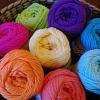
Fuzzy Worms
Source Institutions
In this activity, learners explore the concepts of natural selection and observable traits in a game that can be played at home.

Rabbit Olympics
Source Institutions
This activity (on page 2 of the PDF under SciGirls Activity: Rabbits) is a full inquiry investigation into observing, recording, and graphing animal behavior.

Oil Spill Solutions
Source Institutions
In this activity, learners explore how environmental engineers might approach solving the problem of an oil spill.
Composting: A Scientific Investigation
Source Institutions
In this activity, learners conduct a scientific investigation involving decomposition and discover that the life cycle of trash is affected by its organic or inorganic nature.
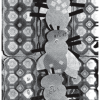
Bee Builders
Source Institutions
In this activity, learners make a model of a beehive using simple materials.
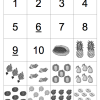
Memory Match
Source Institutions
In this classic memory game (on pages 37-45 of PDF), learners turn over tiles to reveal images on the back.
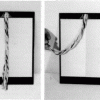
Gray Step
Source Institutions
In this activity, learners discover that it's difficult to distinguish between two different shades of gray when they aren't separated by a boundary.
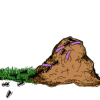
ANTacid: Indicator Paper on an Anthill
Source Institutions
In this activity, learners make acid/base indicator paper, place the indicator paper on an anthill, disturb a bunch of ants, and then observe what happens!

Canned Heat
Source Institutions
In this activity, learners explore how light and dark colored objects absorb the Sun's radiations at different rates.
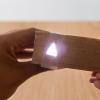
Afterimage
Source Institutions
In this activity about light and perception, learners discover how a flash of light can create a lingering image called an "afterimage" on the retina of the eye.

Sustainable Fishing
Source Institutions
In this activity, learners use a model for how fishing affects marine life populations, and will construct explanations for one of the reasons why fish populations are declining.

Nano Latch-n-Catch
Source Institutions
In this activity, learners design a therapeutic agent to image and/or cure various diseases in the respiratory system.
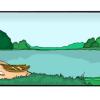
Rock Bottoms
Source Institutions
Learners add acid rain (nitric acid) to two cups that represent lakes. One cup contains limestone gravel and the other contains granite gravel.
Diffraction Between Wax Blocks
Source Institutions
In this optics activity, learners explore diffraction by adding wax blocks to a ripple tank. The wedge-shaped blocks act as obstacles that the wave must bend around.
